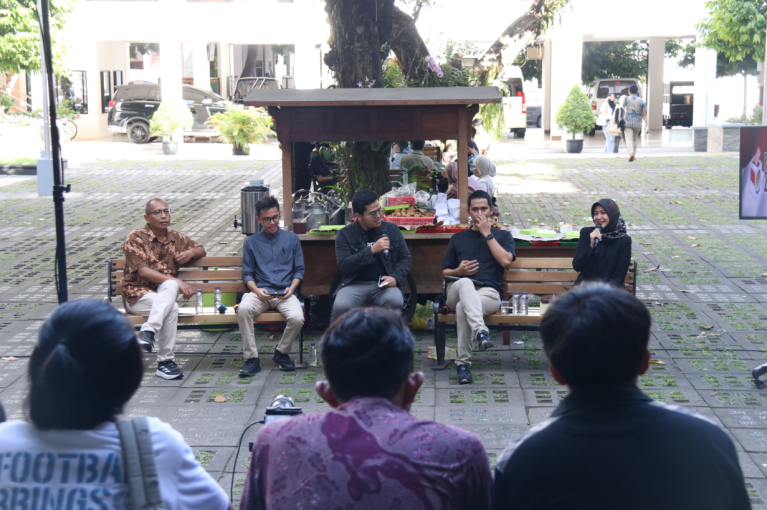
Yogyakarta, February 21st 2024─The 2024 general elections that were held on February 14 left challenges and notes from the public, political observers, and academics. Pares Indonesia together with Perludem, the Department of Politics and Government of the Faculty of Social and Political Sciences, and Election Corner held a discussion entitled “The Path to Maintaining the Integrity of the 2024 General Elections” at Sansiro Park in the Faculty of Social and Political Sciences and broadcasted live on Pares Indonesia’s YouTube channel on Wednesday (21/02). “The challenges of the 2024 elections are much tougher than the previous elections in 2019. The data I took from the Election Vulnerability index includes neutrality, then workload, community polarization, money politics, and the SIREKAP problem,” explained Umi Illiyana, Member of Bawaslu D.I. Yogyakarta. Umi also mentioned that there is a special case in Yogyakarta related to the level of voter participation from overseas students. As transfer voters, many overseas students in Yogyakarta cannot channel their voting rights.
Emanuel Prince, an UGM Student and Member of KPPS shared his experience as KPPS Chairman in his neighborhood in Tangerang. “The first problem is the workload, whether you want it or not, the number of ballots is 5 models, the number of voters, then the matter of digitization, especially Sirekap, which on the D-day the system is down,” he said. He added that on the D-day of the election, KPPS officers worked for a full 20-24 hours.
Meanwhile, Mada Sukmajati, a Lecturer of DPP Fisipol UGM, said there are two important concepts, namely electoral integrity and electoral malpractice. In short, electoral integrity is the extent to which elections are carried out in a free and fair manner and election compliance with international norms and standards. According to Mada, the impact of elections held by violating the principle of electoral integrity will result in many electoral malpractices.
“For example, he will clearly reduce the quality of representation, the quality of our representation with our people’s representatives, both those sitting in the legislature and the executive. Then it can reduce the legitimacy of the elected government. It can also encourage political corruption, if we talk about malpractice,” explained Mada.
Heroik M. Pratama, Perludem Researcher, underlined electoral malpractice which is divided into 3 layers of malpractice, namely 1) institutional manipulation, 2) voter manipulation, and 3) vote manipulation in the vote recapitulation process.
“If we want to see election integrity and electoral malpractice, we can’t just look at one stage. We must look at all stages. Well, one of them is the pre-election,” said Heroik.
Heroik explained the 2024 pre-election malpractices that occurred, such as the absence of a revision of the electoral legal framework, the formation of a national selection team, the defects in passing political parties, electoral districts, ex-convicts running for office, a 30% quota for women’s candidacy and campaign finance reports.
Finally, the discussion addressed the rampant pork barrel politics. According to Umi, the cause of pork barrel politics and money politics is due to regulatory loopholes that are exploited by election participants. This is in line with Mada’s opinion about the weakness of the Election Law.
“Our Election Law, which from experience so far, shows that there are many weaknesses. One of them is that our election law is not only comprehensive but also not synergized,” Mada explained.
